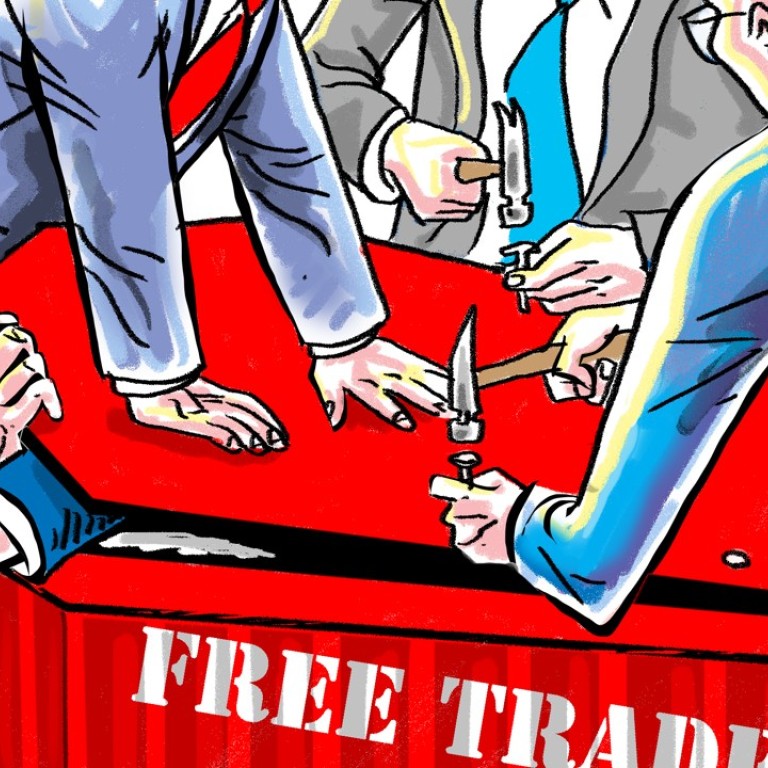The
United States’ tit-for-tat tariff spat over steel and aluminium with its Nafta partners and the
European Union is another nail in the coffin for free
trade. While President
Donald Trump’s approach to trade is erratic, the other major trading nations are only focused on tactics to contain Trump, and are not responding to the underlying causes of the tension.
While a major trade war is unlikely for now, because all parties are scared of the short-term consequences, the frequent skirmishes will deter multinational
companies from making cross-border investments, especially in emerging economies. Free trade will die a slow death.
The receding tide of globalisation has far-reaching consequences for the
global economy and financial
markets. Low inflation, high economic growth and a rising share of profit in the global economy have powered financial markets over the past three decades, producing long-term bull markets for
bonds and stocks. All three trends could be reversed in the coming decades; both bonds and stocks could be heading for protracted bear markets.
The current crisis stems from global leaders who have ignored globalisation’s impact on labour and kept faith in the rising tide to solve all problems. But the negative impact on workers in the most open economies like the US and
UK has become worse and worse.
Real wages in the US have
stagnated for four decades, while college tuition and
health care costs have tripled in real value. The trend is incredibly unfair for most people.
Education and health care costs are no big deal for rich people but take up huge chunks of income for most.
To add insult to injury, the squeeze between stagnant wages and rising living costs is a result of the same force. Globalisation has kept inflation low, which has allowed
central banks to keep
interest rates low, which inflated financial assets and benefited the rich. But, predictably, it inflated non-tradeable sectors like education and health care. If the trend is not addressed, it’s just a matter of time before a revolution happens. If you think Trump is bad news, what comes next could be a lot worse.
Watch: China and US put trade war on hold
The mantra that trade is good for all simply isn’t true. There is a high fixed cost in what people do, because they have accumulated experience over many years and sunk most of their savings into the community close to where they work. When they are displaced, they could lose both. People who live in small towns and rural areas are especially vulnerable.
While workers in developed countries are most negatively affected by globalisation, emerging economies have trouble upgrading their industries. We must recognise that the current batch of global companies first developed in protected markets. Without protection, emerging economies wouldn’t have their
Toyotas or Exxons. Hence, emerging economies, especially big ones like
China and
India, have their doubts about free trade.
The existing multinational corporations benefit most from globalisation and are its biggest supporters. They form the
Davos crowd and use their
financial power to influence politicians. The rising anti-establishment sentiment reflects the nefarious impact of this unholy alliance on the less fortunate.
While the
spat between the US and China gets the most attention, the EU and
Japan are big problems, too. The EU rails against protectionism over Trump’s tariffs, yet it is no saint. It has over 50 anti-dumping measures against Chinese products. Floor tiles and cycles are two ridiculous examples. How could the EU compete in making bicycles, at least in volume?
The protection doesn’t even help workers, because the cycles are made in China anyway but are sold under European brands. The sole purpose seems to be to prevent China from developing its brands while preserving cushy jobs for some high-income earners.
While the US is viewed as the bad boy in the ongoing disputes, we must recognise that the EU, Japan and China are far more mercantilist. Trump is a symptom, not the cause, of the instability in the global trading system. If anyone ought to step up now to solve the free trade issue, it is the EU. It is a big, rich economic bloc that practises mercantilist policies. If it doesn’t own up and change its ways, why would China or Japan change?
The current world order is simply unsustainable. It depends on the US issuing excess dollars to absorb the imbalances. It has worked for so long because emerging economies have been accumulating
foreign exchange reserves to safeguard their currency stability.
Also, the wealth accumulation in emerging economies creates demand for dollars due to political insecurity at home. As the US’ problems mushroom, confidence in the dollar could collapse. When that happens, it will plunge the whole world into chaos. The US economy will suffer from a collapsing dollar and high inflation. And emerging economies will suffer financial crises due to the huge loss of wealth.
Few people in the establishment believe in the above scenario. They focus on how to get through the next quarter. The euphemism is that policy is data dependent, just like before 2008. The world is sleepwalking into a far bigger crisis in the coming years.
Unfortunately, as in the
2008 crisis, it is the little people who will suffer. The elite who are pushing the world into this catastrophe will have stashed away tons of assets in tax havens. They will be on the beach while the world writhes in agony.
Andy Xie is an independent economist


